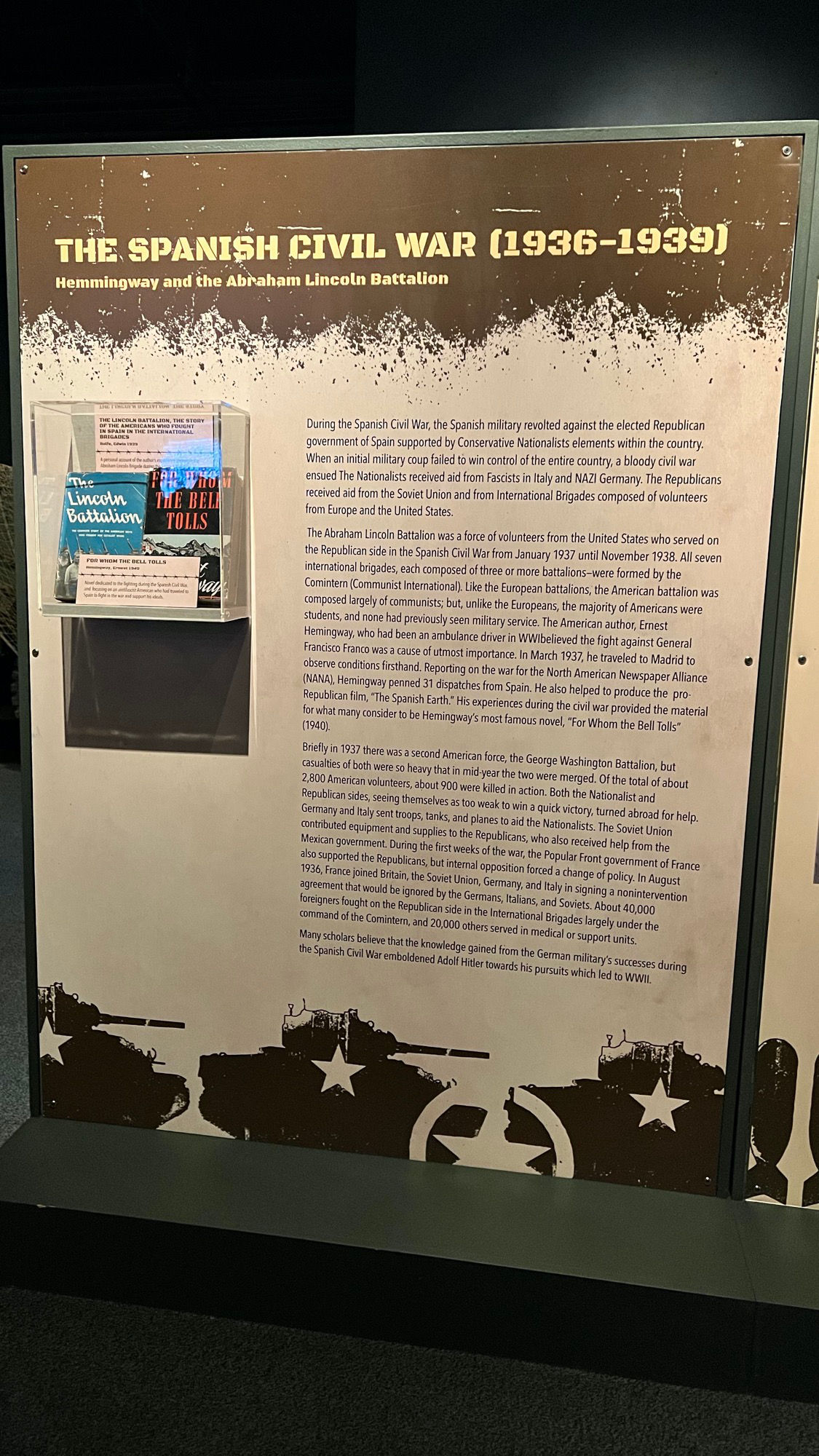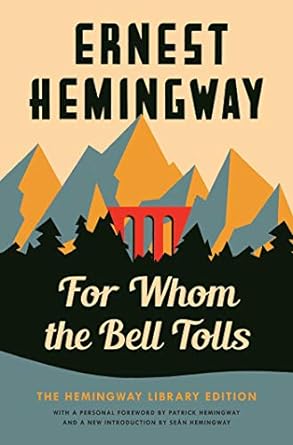It was a bloody civil war in Spain fought from 1936 to 1939. It started when General Francisco Franco of the Spanish military revolted against the democratically elected government of Spain. Fascists Adolf Hitler (Germany) and Benito Mussolini (Italy) backed Francisco Franco along with Portugal.
Anti-fascists Soviet Union and Mexico (plus volunteers from France, Poland, Canada, and the US) backed the new democratic government. The US and the UK did not get involved and the fascists easily won. Franco remained Spain’s dictator for nearly 40 years.
Germany's military successes during the Spanish Civil War emboldened Adolf Hitler towards his pursuits that led to WWII.

Hemmingway and the Abraham Lincoln Battalion
During the Spanish Civil War, the Spanish military revolted against the elected Republican government of Spain supported by Conservative Nationalists elements within the country. When an initial military coup failed to win control of the entire country, a bloody civil war ensued. The Nationalists received aid from Fascists in Italy and NAZI Germany. The Republicans received aid from the Soviet Union and from International Brigades composed of volunteers from Europe and the United States.
The Abraham Lincoln Battalion was a force of volunteers from the United States who served on the Republican side in the Spanish Civil War from January 1937 until November 1938. All seven international brigades, each composed of three or more battalions - were formed by the Comintern (Communist International). Like the European battalions, the American battalion was composed largely of communists; but, unlike the Europeans, the majority of Americans were students, and none had previously seen military service.
The American author, Ernest Hemingway, who had been an ambulance driver in WWI believed the fight against General Francisco Franco was a cause of utmost importance. In March 1937, he traveled to Madrid to observe conditions firsthand. Reporting on the war for the North American Newspaper Alliance (NANA), Hemingway penned 31 dispatches from Spain. He also helped to produce the pro-Republican film, "The Spanish Earth. His experiences during the civil war provided the material for what many consider to be Hemingway's most famous novel, "For Whom the Bell Tolls" (1940).
Briefly in 1937 there was a second American force, the George Washington Battalion, but casualties of both were so heavy that in mid-year the two were merged. Of the total of about 2,800 American volunteers, about 900 were killed in action. Both the Nationalist and Republican sides, seeing themselves as too weak to win a quick victory, turned abroad for help. Germany and Italy sent troops, tanks, and planes to aid the Nationalists. The Soviet Union contributed equipment and supplies to the Republicans, who also received help from the Mexican government. During the first weeks of the war, the Popular Front government of France also supported the Republicans, but internal opposition forced a change of policy. In August 1936, France joined Britain, the Soviet Union, Germany, and Italy in signing a nonintervention agreement that would be ignored by the Germans, Italians, and Soviets. About 40.000 foreigners fought on the Republican side in the International Brigades largely under the command of the Comintern, and 20,000 others served in medical or support units.
Many scholars believe that the knowledge gained from the German military's successes during the Spanish Civil War emboldened Adolf Hitler towards his pursuits which led to WWII.

Hemmingway, Ernest 1940
Novel dedicated to the fighting during the Spanish Civil War and focusing on an antifascist American who had traveled to Spain to fight in the war and support his ideals.
On July 18, 1936, troops under the leadership of General Francisco Franco began an uprising against the democratically elected government of Spain. This revolt quickly escalated into a civil war. The Spanish Civil War is sometimes called a prelude to World War II. Many foreign powers supported different sides of the Spanish Civil War. Republicans, who supported the overthrown democratic republic, were supported with munitions and money from the Soviet Union and Mexico. Volunteers, nicknamed the International Brigades, came from countries including Ireland, France, Poland, Canada, and the United States. (The group from the U.S. called themselves the “Abraham Lincoln Brigade.”)Spanish Civil War
On July 18, 1936, Spanish troops began an uprising that led to the Spanish Civil War, often recognized as a prelude to World War II.Many celebrities, such as British writer George Orwell and American novelist Ernest Hemingway, supported the Republican cause. Germany, Portugal, and Italy supported Franco’s Nationalists. International volunteers from France, Portugal, and Morocco also supported Franco. Celebrities who supported the Nationalists included British novelist J.R.R. Tolkien and American writer Gertrude Stein.
The Republicans were crushed
Franco remained Spain’s dictator for nearly 40 years. Spain was a nonbelligerent during World War II, but supplied economic and military assistance to the Axis powers during the conflict.
Why So Many Foreigners Volunteered to Fight in the Spanish Civil War
More than 35,000 volunteers from 52 countries poured into Spain to help fight fascist-backed Nationalists led by Francisco Franco.History.comJuly of 1936
A failed military coup plunged Spain into civil war. The conflict pitted the leftist Republican government against fascist-backed Nationalists led by General Francisco Franco. With Adolf Hitler and Benito Mussolini already in power in Germany and Italy, anti-fascists around the world feared that Spain would be the next to fall, threatening the future of European democracy.When world powers like the United States and the United Kingdom refused to intervene in the Spanish Civil War, more than 35,000 anti-fascist volunteers poured into Spain from 52 countries to take up arms against the Nationalists. They included Jewish refugees from Nazi Germany, idealist intellectuals like a young George Orwell and communists committed to crushing an ideological enemy.
The foreign volunteers who fought in the "International Brigades" of the Spanish Civil War hoped to stop the march of fascism in Europe to avoid a much larger war. It didn't work out that way.
The Spanish Civil War broke out less than 20 years after the end of World War I, and most world leaders desperately wanted to avoid being drawn into another global conflict potentially costing millions of lives.
In the United States, President Franklin D. Roosevelt failed to convince Congress to support the Spanish Republic. Instead, lawmakers passed a series of Neutrality Acts that cemented America's isolationist stance in the 1930s.
More than 2,800 Americans, many who were members of the American Communist Party, crossed the Atlantic to volunteer as part of the Abraham Lincoln Brigade. Around a third of the volunteers were Jewish, spurred by a desire to combat the spread of anti-semitic fascist regimes in Europe.
Of the roughly 35,000 foreign volunteers who fought in the Spanish Civil War from 1936 to 1939, an estimated 5,000 to 6,000 were killed and thousands more were recorded as missing. They paid the ultimate sacrifice for their ideals, but in the end it wasn't enough. Franco and the Nationalists, with help from Hitler and Mussolini, overpowered the Republicans, took Madrid and won the war.
WIKIPEDIAThe Spanish Civil War
Was a civil war in Spain fought from 1936 to 1939 between the Republicans and the Nationalists.Republicans were loyal to the left-leaning Popular Front government of the Second Spanish Republic, and consisted of various socialist, communist, separatist, anarchist, and republican parties, some of which had opposed the government in the pre-war period.
The opposing Nationalists were an alliance of Falangists, monarchists, conservatives, and traditionalists led by a military junta among whom General Francisco Franco quickly achieved a preponderant role.
Due to the international political climate at the time, the war had many facets and was variously viewed as class struggle, a religious struggle, a struggle between dictatorship and republican democracy, between revolution and counterrevolution, and between fascism and communism.
According to Claude Bowers, U.S. ambassador to Spain during the war, it was the dress rehearsal for World War II. The Nationalists won the war, which ended in early 1939, and ruled Spain until Franco's death in November 1975.
The war became notable for the passion and political division it inspired worldwide and for the many atrocities that occurred. Organised purges occurred in territory captured by Franco's forces so they could consolidate their future regime. Mass executions on a lesser scale also took place in areas controlled by the Republicans, with the participation of local authorities varying from location to location.











